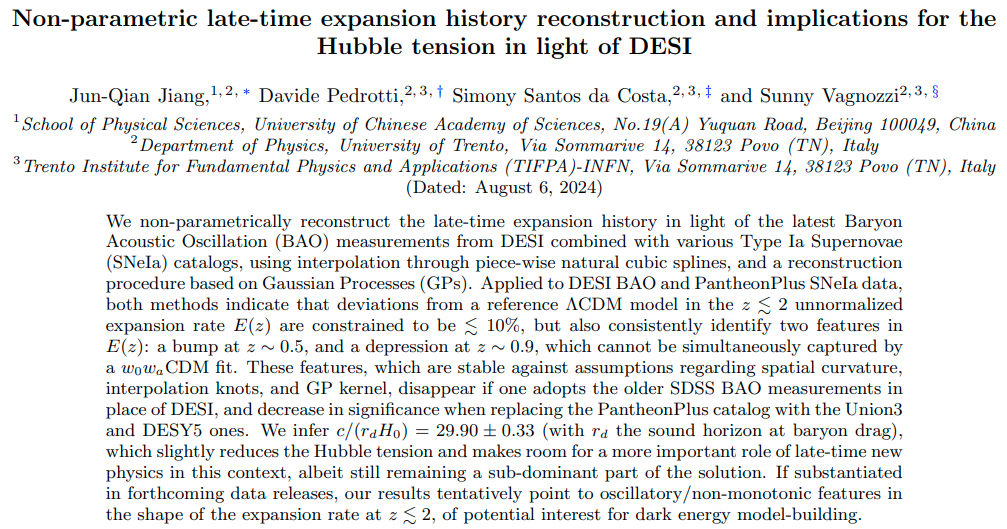My paper with Jun-Qian Jiang, William Giarè, Stefano Gariazzo, Maria Giovanna Dainotti, Eleonora Di Valentino, Olga Mena, Davide Pedrotti, and Simony Santos da Costa, where we investigate the status of (positive) neutrino mass cosmology after the latest DESI measurements (see this earlier news item), has now officially been published in JCAP! The full bibliographic coordinates for the paper are JCAP 2501 (2025) 153. Here is the link to the paper (which is published Open Access).
Post-DESI neutrino cosmology paper accepted in JCAP!
My paper with Jun-Qian Jiang, William Giarè, Stefano Gariazzo, Maria Giovanna Dainotti, Eleonora Di Valentino, Olga Mena, Davide Pedrotti, and Simony Santos da Costa, where we investigate the status of (positive) neutrino mass cosmology after the latest DESI measurements (see this earlier news item), has been accepted for publication in JCAP! The paper has undergone has a substantial revision, which resulted in the addition of several appendices clarifying various technical aspects of the analysis (e.g. cosmology-internal tension, impact of PR4 likelihoods, and H0 versus MB prior among others), as well as an additional useful plot, and useful discussions on the neutrino mass ordering: however, the main results are unaltered, and are now more robust. You can read the preprint version of the paper on arXiv: 2407.18047.
Non-parametric expansion history reconstruction paper published in PRD!
My paper with Jun-Qian Jiang, Davide Pedrotti, and Simony Santos da Costa, where we perform a non-parametric reconstruction of the late-time expansion history in light of DESI BAO data (see this earlier news item), has now officially been published in PRD! The full bibliographic coordinates for the paper are Phys. Rev. D 110 (2024) 123519. Here is the link to the paper.
Non-parametric expansion history reconstruction paper accepted in PRD!
My paper with Jun-Qian Jiang, Davide Pedrotti, and Simony Santos da Costa (first one entirely produced within my group), where we perform a non-parametric reconstruction of the late-time expansion history in light of DESI BAO data (see this earlier news item), has been accepted for publication in PRD! Compared to the earlier version, there have been minor changes to the plots and title, but our main results are unaltered. You can read the preprint version of the paper on arXiv: 2408.02365.
Non-parametric expansion history reconstruction and Hubble tension after DESI
I’m particularly excited and proud about today’s paper, which is the first one written entirely and exclusively with members of my group: visiting PhD student Jun-Qian Jiang (who did all the heavy lifting), PhD student Davide Pedrotti, and postdoc Simony Santos da Costa. What we did has been to perform a non-parametric reconstruction of the late-time expansion history in light of DESI BAO data, combined with various SNeIa datasets, using both interpolation and Gaussian Process reconstruction techniques, and studying implications for the Hubble tension. We find that the shape of the expansion history cannot deviate more than 10% from that of ΛCDM, but within that 10% we find interesting deviations which could hint to a non-monotonic/oscillatory behaviour of the expansion rate (and therefore of the dark energy component). I really believe that this can be a pretty important paper, as it represents a much needed revisitation in light of DESI of two seminal papers in the expansion history reconstrcution and Hubble tension literature: the famous “Trouble with H0” paper by Bernal, Verde, & Riess, and the equally famous “Sounds discordant” paper by Aylor and collaborators. You can read our results in the preprint we just posted on arXiv: 2408.02365.
Post-DESI neutrino cosmology
Another paper out today! Led by Jun-Qian Jiang and William Giarè (both of whom did a huge amount of work), and together with Stefano Gariazzo, Maria Giovanna Dainotti, Eleonora Di Valentino, Olga Mena, Davide Pedrotti, and Simony Santos da Costa, we investigate the status of (positive) neutrino mass cosmology after the latest DESI measurements. We find very tight upper limits on the sum of the neutrino masses, a strong preference for the normal ordering, and a significant tension with terrestrial observations, all of which we carefully quantify. We also studied the impact of allowing the dark energy component to be non-phantom, which makes all the previous conclusions somewhat stronger, and highlights an interesting synergy between laboratory experiments aimed at determining the neutrino mass ordering, and the nature of dark energy. You can read our results in the preprint we just posted on arXiv: 2407.18047.





